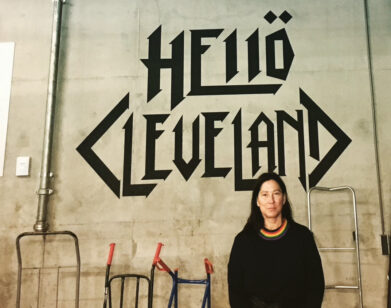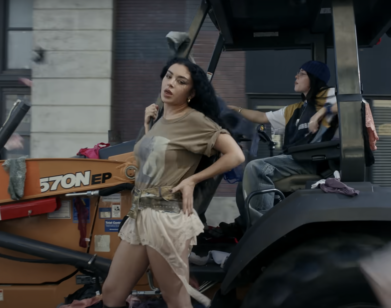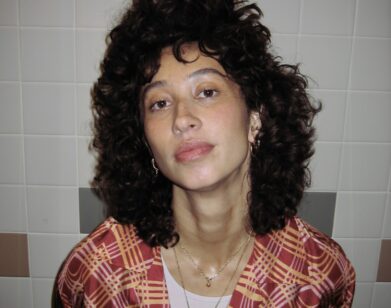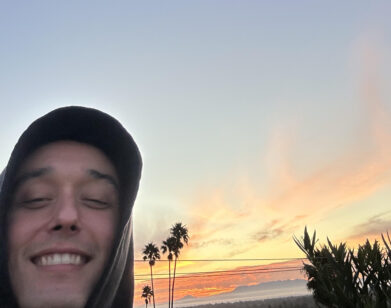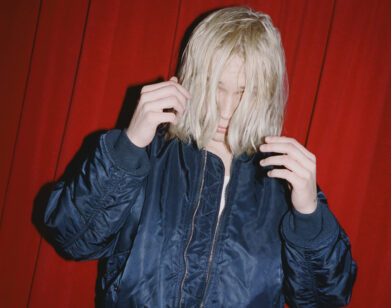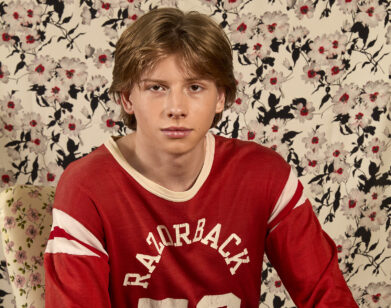Exclusive Song Premiere and Interview: ‘I’ll Earn My Collapse,’ Wharfer
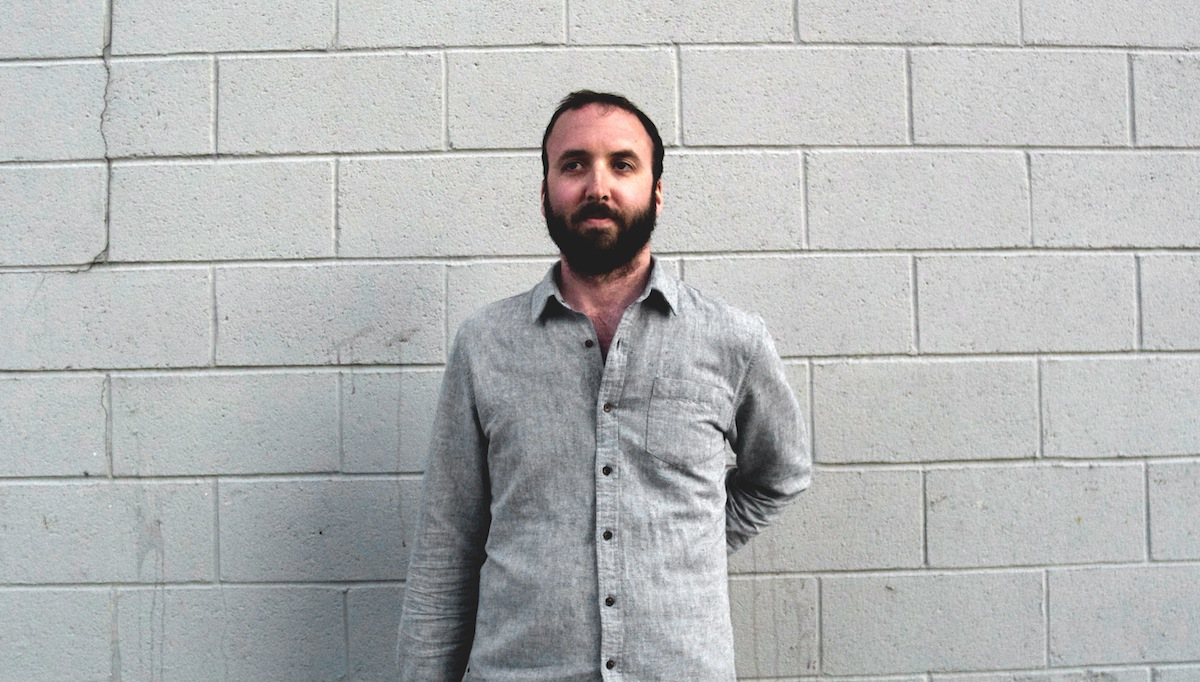
ABOVE: KYLE WALL, AKA WHARFER.
There’s something particularly beautiful about Wharfer. Just the name alone evokes a sense of calmness and contentment. Wharfer is the moniker for Brooklyn-by-way-of-Scranton’s Kyle Wall, who released his debut record The Rattling last year. Wall has created his own version of haunting, yet gorgeous folk music that is hard to ignore. It could be his deep voice—reminiscent of Leonard Cohen or Tom Waits—but it’s also the way he forms lyrics; most are streams of consciousness, which add an ethereal quality to his music. Wall certainly has brought new meaning to Brooklyn bedroom-folk with this new addition to the Wharfer collection.
On the verge of releasing his Eyelids EP, Wharfer has found a new confidence and sound with his voice. We’re excited to premiere the musician’s avant-garde folk track “I’ll Earn My Collapse,” which was a late addition to the EP. We also spoke with Kyle Wall about recording on his phone, discovering a mysterious record, and creating songs while dealing with health issues.
ILANA KAPLAN: How did you come up with the moniker Wharfer for your project? I know we’ve changed it into wharfing, wharfed, etc. to use in regular conversation. [laughs]
KYLE WALL: There’s no good story there. I was recording and writing songs last year just to see if I could sing and write songs on my own, because I was in a band for years and years in high school and college called The Minor White. It started before I was in it, back in sixth or seventh grade by some of my still-best friends, including Roy and Shane who play on this EP. It was based out of Scranton and people we grew up with. We put out an album and an EP. We played some good shows. We were proud of the way we sounded at the end, but it had run its course. We played with some legit bands and good bills.
KAPLAN: It sounds like you had a good run in The Minor White. So back to how Wharfer started and the name…
WALL: I started recording demos using my phone. One thing led to another, and my friends who know more about this stuff than I do were like, “This actually sounds pretty good, you should put it out.” When I was going to put it out, I didn’t want to just be Kyle Wall. So many of my favorite people are first name, last name singer-songwriters. Starting off, it’s tough to convince people to listen to your music—like, “Kyle Wall, singer-songwriter from Brooklyn” is the most boring pitch you can give someone. I kind of had that in mind from my background in marketing and PR stuff. Wharfer was just a word, and I went with it. I think I made a point to not think about it too much.
KAPLAN: What’s the biggest difference between the Eyelids EP versus your debut record?
WALL: I’m very proud of the album I did last year, but it was all a learning experience. The 10 songs that were on there were from last spring and last summer, when I was learning to sing and record, even if it was in the crudest manner possible. Looking back, it’s easy to see where I’ve grown since then. I have much more confidence in my voice now, whereas last year I was kind of scared of learning how to sing. I’m not going to say I’m a great singer, but you can hear me branching out more with a little more confidence. Musically, there are other people on this EP. Last time, it was all me playing different instruments and singing everything. This time some of my friends that played in The Minor White contribute on electric bass and drums. I have a friend that plays double bass on a song; I have a friend that plays cello on a song. Finally, there’s more of a cohesive sound. This EP is five songs, and these songs are more cohesive than the last record, which was three or four songs in one style and two or three songs in another.
KAPLAN: I can definitely see this. Is there a particular theme that resonates in this EP lyrically?
WALL: On the surface, no, because most of the time I don’t know what I’m writing about. It’s a lot of words going through my head. Subconsciously, I had a lot of health stuff going on. Last fall I found out that I had that tumor and I went a few months not knowing what was going to happen. A few months later I found out I was going to need surgery. I didn’t know what kind of procedure that was going to be.
KAPLAN: That’s really scary.
WALL: Then I had a surgery, and then I was in recovery. Then I had to go in for another surgery. The five songs on here were written after all of the stuff had come up, but in different phases. I don’t know if I can point to specific words or lines, but definitely all of that stuff played a role in the writing of the songs. I’m not one to dramatize it, but if there was one set of concerns or worries you might look inside the lyrics for to pick apart, that would be the number one. Other than that, it’s just the usual confusing stuff people write and sing about.
KAPLAN: So, jumping off from there, what was “I’ll Earn My Collapse” about, since we’re premiering it?
WALL: That one was written last fall, but it was the last one I recorded. I was thinking of doing a four-song EP, but at the last second after I had sent it to be mastered, I decided to record the track and had knocked it out in one day. Musically, it’s a little different in that it’s structurally a folk song. Lots of people have described my music as folk, but this is probably the best example of a folk song. It’s six verses repeating with a waltz format. More than any other song, this is the one people can safely say is a folk song. I hated all of the demos I did of it. Maybe it was the fact that it was repetitive, but I finally figured out an arrangement I liked. Lyrically, I can’t help you out. A lot of my stuff I’ll sit down and write it all at once.
KAPLAN: Who influenced Wharfer this time around?
WALL: Not to go all obscure on you. It’s this guy Lewis. His record came out in ’83 or ’84. This guy is a ghost—there’s no real backstory to this guy. The story is that someone found his vinyl in a bin in Canada and started showing it around. There’s this record that’s just got passed around. It’s the most beautiful thing you’ll ever hear. It’s just really, really great songs. The album is called L’Amour. Within the past month or two, they’ve re-mastered and released it, so it’s on Spotify now. It’s so good, and you can tell it’s a pretty lo-fi recording setup. It’s very weird: sort of folk, sort of pop and piano ballad-y. It’s a very strange mix of piano, acoustic guitar, and synthesizer, which are the instruments I used. It’s a creepy, but pleasant sound that’s hard to pull off. It’s not something I actively try to do, but I would take that as a huge compliment [if someone said that about my music].
WHARFER’S EYELIDS EP COMES OUT JUNE 10. FOR MORE ON THE ARTIST, PLEASE VISIT HIS FACEBOOK PAGE.

